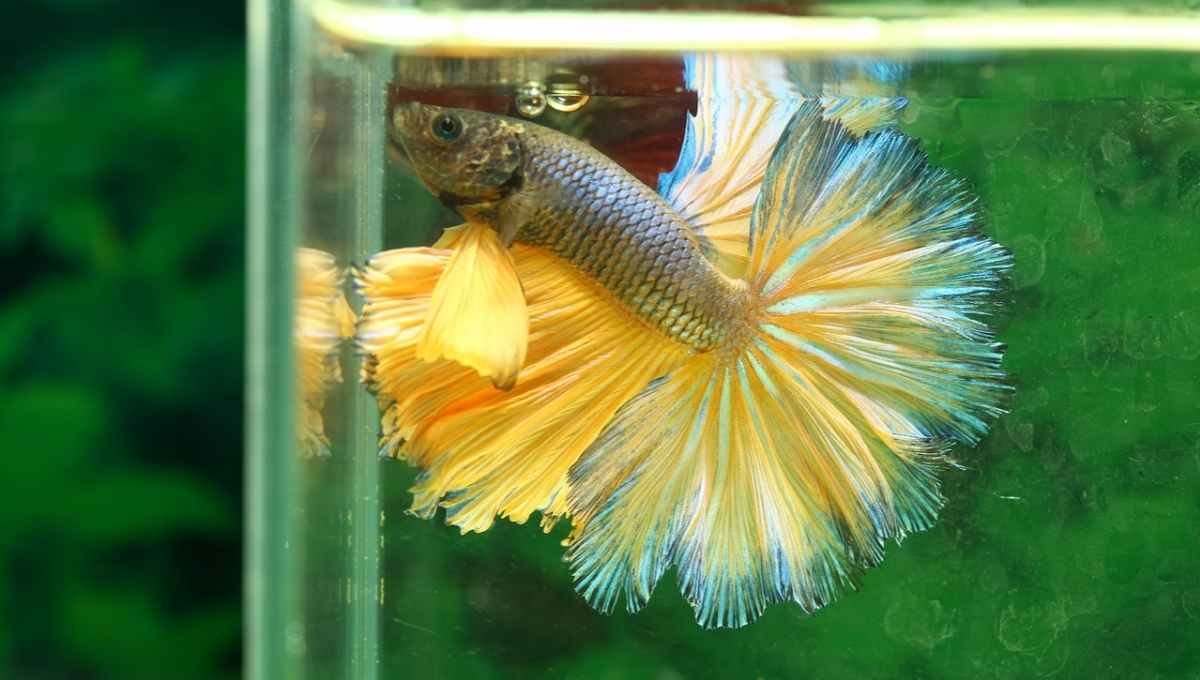
The right environment and tank are just as important as the right food for a betta fish. Betta fish is an omnivorous fish. Generally, betta fish in nature survive by eating a variety of insects, insect larvae and plant roots.
So before keeping betta fish in our home tank it is very important to know about betta fish diets. So today our topic is about betta fish food.
Nutritional needs of betta fish food :
Since our betta fish are omnivores, they should be fed a combination of carnivorous and herbivorous diets. Generally, depending on the nutritional quality of the diet, betta fish require 30 to 35 percent protein and 5 to 7 percent fat.
Not only that, calcium and essential minerals have a substantial role for betta fish. Adequate amounts of vitamins and minerals are provided to our betta fish to keep them healthy and boost their immune system.
A small amount of sunlight is very beneficial for our betta fish because sunlight provides vitamin D which keeps our fish healthy and makes our fish look much brighter.
Type of betta fish food :
We feed our betta fish in a variety of ways, depending on the quality and nutritional properties of the food. So below is mentioned about the nutritional value and reaction of the food.
Flake fish food :
Flake food is actually a type of dry food that is easily available in the market or online. Flake food is much cheaper than other food and its nutritional value is very high. So most people who keep betta fish prefer flake food.
Flake food pros :
- Flake food provides adequate amounts of protein, vitamins and minerals. Which is very important for our betta fish.
- Flake food is much smaller in size which is more convenient for our betta fish to eat.
- The flake food floats on the top of our water for a short time then slowly settles to the bottom of the water tank. So, our betta fish can easily accept the flake food.
- We can store this flake food for a long time for our betta fish. But it has a certain period after which the food should not be fed to our fish.
Flake food cons :
- Flake food easily spreads throughout our tank, increasing the tendency for wastage.
- If our food starts to waste too much then that food will sink to the bottom of the tank and produce ammonia which is harmful to our fish.
- Flake food tends to lose its nutritional value as it ages, which is a concern for our fish.
Pellets fish food :
Pellets are a type of dry food. We can easily get this food in the market or online. Pellets are an ideal food for any fish, not just betta fish.
Pellets food pros :
- Pellet food contains the right amount of vitamins, minerals, proteins and fats. So pellets are a healthy diet for our betta fish.
- We can store pellet food for many days for our betta fish.
- The pellet feed floats on top of the tank for a long time and this floating food can easily be consumed by our fish.
- The pellet food comes in different sizes so depending on the size of our fish we can give him a certain size pellet. It is much more convenient to feed our fish in fixed quantities.
Pellet food cons :
- The price of pellet food is much higher than other food.
- Abandoned pellet foods tend to accumulate at the bottom of our tanks and help create ammonia which is harmful to our fish.
- There are different companies of pellet food available for betta fish but we should choose the right company of pellet food for our fish depending on their nutritional quality.
Frozen fish food :
Frozen food actually falls under the list of carnivore foods. This frozen food is very beneficial and healthy.
Frozen food pros :
- Frozen foods are high in protein. Which helps to improve the color and size of our betta fish and increase activity.
- Not only this, frozen food also contains a large amount of vitamins and minerals that improve the immune system of our fish. So frozen food is most popular for betta fish.
- Frozen food is easily and happily eaten by our betta fish.
Frozen food cons :
- Although we can refrigerate frozen food, it has a specific shelf life. After that time limit, the food is more prone to spoilage.
- Frozen food costs a lot more than other foods so it may not be possible for everyone to spend so much.
- Frozen food increases the chances of harmful bacteria entering our aquarium which is very harmful to our fish.
- Frozen food easily settles to the bottom of the tank and helps create ammonia. We know how harmful ammonia is to our fish.
Live fish food :
Live fish food mining refers to the feeding of live insects and their larvae. In nature, beta fish survive on life food. So live fish food is the most essential food for our fish.
Live food pros :
- A lot of protein is found in this food. Also found, some vitamins and minerals that are very important for our fish.
- If we add live fish food to our fish’s diet, our fish’s color and size will be greatly improved, along with improved immunity.
- Live fish food is what our betta fish love to eat and doesn’t waste much.
Live food cons :
- Live Fish Food is priced much higher than other pellet and flake foods.
- Live fish food is not easily available everywhere.
- Live fish food cannot be stored for very long.
- Live fish food increases the chances of bacteria or fungi in our tank which are very harmful to our fish.
How often do you feed a betta fish ?
How much we feed our betta fish and how often we feed it depends on the exact age of the betta fish.
If our betta fish is between one and two months of age then feed a pinch or very small amount every four hours.
If our betta fish is three to six months old. Then we can feed them after six to eight hours. Generally, betta fish of that age should be fed in the morning and in the evening.
Again if our betta fish is in breeding condition then we should be fed a little more.
How much food should be given to Betta fish?
We have discussed how often to feed a betta fish but it is very important to know how much to feed.
If we give betta fish flake food then a pinch of food in the morning and evening is sufficient.
If we feed pellet food to our betta fish then three to four pellets in the morning and evening are sufficient.
Again if we are using frozen food or live food for our betta fish then only a pinch of food should be given once a day in the morning.
Note: One thing we should always keep in mind is that we never feed our betta fish more than it needs. If we feed our betta fish too much, the unnecessary food will sink to the bottom of the tank and help create ammonia which is very harmful to our fish.
So we should give the betta fish a small amount of food which is finished within one to two minutes.
If the food is not finished within one to two minutes then it should be understood that the rest of the food is unnecessary food. So the amount of food should be reduced a little from next time.
Whenever we feed our betta fish for the first time be sure to check how much food is indicated on the food packet.
How long can a betta fish go without food ?
Discussing betta fish food one thing we should be aware of is how long a Betta fish can go without food. If for some reason we have to go out of town how will we feed our betta fish or will they survive?
A betta fish can go without food for 10 to 12 days in an aquarium. But as a result the physical condition of the fish becomes very difficult.
That is because the fish will be physically weak due to not getting enough food. The immune system will be greatly reduced which makes it easy to get infected by other bacteria and the betta fish can die within a few days.
So what should we do?
We should always buy an automatic feeder. Whenever we have to go out of town for some work we use the automatic feeder in our betta fish tank.
In these automatic feeders, we can easily fill pallets for a given day. Not only that, in this automatic feeder we will determine the time limit and how many pallets to throw.
By using an automatic feeder we can give our betta fish enough food. As a result, our fish will be healthy and live longer.
As we have said time and time again, keeping betta fish at home is not just a hobby, it is a responsibility.

Welcome to our website Aquarium Fish Zone. My name is Sagar Ghosh and I live in Kolkata. I am a science graduate.
I have kept fish in aquariums since I was very young. I loved seeing the colorful fish in the aquarium.
I have always tried to maintain and care for the fish properly. So me and my team members have created this website. As a result, we can provide you with accurate information about how aquarium fish are kept.
